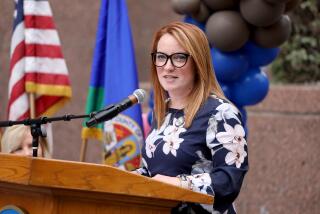New Mayor Visits Valley in Bid to Counter Secession
- Share via
It was not an ideal day to visit the San Fernando Valley. The heat was sweltering, and sweat dampened the brow of the new mayor as he helped shovel dirt on saplings being planted in front of a Van Nuys elementary school.
But James K. Hahn was determined to spend his first working day in the Valley, signaling his intent to aggressively court part of the city that has often felt left out of city decision-making, to the point of threatening to leave.
“I wanted to start the week off showing how important I believe it is to connect all the parts of the city,” said Hahn. “I wanted to show that even though I was downtown yesterday, I didn’t waste any time getting to the Valley in my first week in office.”
Hahn has predicted that quashing secession drives in the city will be one of his top priorities, and the Valley is home to the strongest of those efforts.
Hahn enjoyed strong support among Valley moderates and conservatives in the June 5 mayoral election, but it remains to be seen whether he can hold onto that backing as Los Angeles struggles over whether it should divide.
Tuesday was not all about healing divisions; it also was the new mayor’s birthday and Hahn, 51, began the day being serenaded with “Happy Birthday” by the City Council.
By midday, Hahn had peeled off his suit jacket and was helping children plant two Hong Kong orchid trees in front of Kittridge Street Elementary School in Van Nuys. In between shovelfuls of dirt, he praised the work of the Los Angeles Conservation Corps and Operation Clean & Green, two youth summer employment programs that coordinated the school’s greening effort.
Later, Hahn held an hourlong round-table discussion about neighborhood councils with Valley leaders at the Van Nuys civic center.
There, Hahn solicited ideas from about two dozen community leaders on how to make the newly forming councils work. Participants called the discussion itself unusual.
“Never has a mayor held a meeting like this,” said Richard Close, chairman of the secession group Valley VOTE. During his involvement with a Sherman Oaks homeowners group for the last 24 years, Close said, he was always told that the mayor’s office did not want to get involved in community issues for fear of offending the local City Council member.
Replied Hahn: “I don’t think the mayor needs a visa to go into any City Council district to see if they can help.
“You don’t learn very much by sitting at your desk at City Hall,” he said. “You have to get out in the neighborhoods and listen to people about what their issues are.”
As the group snacked on deli sandwiches and potato salad, Hahn quizzed participants about the challenges of organizing neighborhood councils, which were created by the city charter passed in 1999. In October, the Department of Neighborhood Empowerment will begin certifying community groups that have defined their boundaries and met other requirements to become a neighborhood council.
On Tuesday, those assembled expressed a variety of concerns about getting the councils off the ground. Hahn, along with two deputy mayors, scribbled notes as people spoke.
Northridge resident Barbara Romey told the mayor that people in her community are struggling to determine how to define the boundaries of their new council, which must represent at least 20,000 people. Some want to go by ZIP Code, and others want to use natural boundaries.
“When you have that many different people, with that many different ideas, there’s a real problem,” she said.
Wayde Hunter, of the North Valley Coalition, said the broad mandate of the councils--which include homeowners, residents, merchants and schools--makes forming the group a daunting task.
“The city is saying, ‘OK, go set these things up’ and they give us all these rules and they make it almost impossible,” said Hunter, who complained that the councils have to follow parliamentary procedure and state open meeting laws. “We’re only volunteers.”
Hahn reassured some who worried that the councils could usurp powerful homeowners groups, and expressed interest in giving the councils a budget that they could spend on neighborhood needs.
“It’s going to be a struggle,” Hahn said. “We’re not going to get this done in two months, three months or even the first year.”
But, he added, “I want these things to work.”
Ann Ziliak, a member of the North Valley Coalition, supported Hahn’s foe, Antonio Villaraigosa, in the mayor’s race. But after the meeting Tuesday, she said she was impressed by Hahn’s efforts.
“It’s a good beginning,” she said.
More to Read
Sign up for Essential California
The most important California stories and recommendations in your inbox every morning.
You may occasionally receive promotional content from the Los Angeles Times.













